Medical expert of the article
New publications
Preparations
Lung cancer pills
Last reviewed: 08.07.2025

All iLive content is medically reviewed or fact checked to ensure as much factual accuracy as possible.
We have strict sourcing guidelines and only link to reputable media sites, academic research institutions and, whenever possible, medically peer reviewed studies. Note that the numbers in parentheses ([1], [2], etc.) are clickable links to these studies.
If you feel that any of our content is inaccurate, out-of-date, or otherwise questionable, please select it and press Ctrl + Enter.

Malignant lung disease originates from the epithelium of bronchi of different calibers. Depending on the location, central and peripheral cancer are distinguished. Its treatment depends on the stage of detection, type and features of distribution. When choosing pills, the doctor takes into account not only the features of the disease, but also the state of the patient's body.
Drug therapy involves the use of large doses of various drugs. Most often, it is prescribed in the early stages of small cell cancer. This is explained by the fact that this form is extremely aggressive. Platinum drugs, vinca alkaloids, Fluorouracil, Adriamycin and others are used as antitumor agents. Chemotherapy can be combined with radioactive irradiation. It is mandatory before and after surgical treatment. This stops the active growth and reproduction of malignant cells.
Effective pills for lung cancer:
- Prednisolone – glucocorticosteroid
- Carboplatin, Cyclophosphamide – antineoplastic substance
- Hydroxycarbamide is an antitumor agent
Most drugs cause side effects. To relieve them, the patient is prescribed an antiemetic and an anti-nausea drug.
The main feature of lung cancer is pronounced musculoskeletal pain. Early and rapid metastasis requires effective pain relief. For these purposes, opioid narcotic drugs (Morphine, Tramadol, Promedol), non-steroidal anti-inflammatory drugs (Ibuprofen, Indomethacin) and others are prescribed. The use of these drugs should not be long-term, since they have blocking properties, so they can cause addiction. In order to prevent drug addiction, the doctor periodically changes the main set of anti-cancer drugs and pain relief methods.
Avastin
Humanized antitumor agent with monoclonal antibodies. Avastin reduces the risk of metastasis and progression of cancer. Pharmacological group of the drug - antitumor agents used to treat malignant neoplasms.
It is produced in the form of concentrates for the preparation of infusion solutions of 100 mg/4 ml and 400 mg/16 ml. The composition of the drug includes the active substance - bevacizumab and auxiliary components - polysorbate, sodium hydrogen phosphate and dihydrogen phosphate, sterile water and α-trehalose dihydrate.
- Indications for use: lung cancer (non-small cell, recurrent, with metastases, inoperable), colon cancer, colorectal cancer with metastases, pancreatic tumors, malignant diseases in mammology with metastases, ovarian cancer, prostate cancer, peritoneum, fallopian tube, kidney cancer and their primary relapses.
- The solution is administered intravenously, by jet, painful infusions are contraindicated. The first dose is administered within 1.5 hours, further procedures are reduced to half an hour to an hour. The therapy is long-term, if the disease progresses against its background, then the treatment is stopped. Let's consider the standard dosage for various types of cancer:
- Lung cancer (non-small cell, recurrent, with metastases, inoperable) – 7.5-15 mg/kg, once every 21 days.
- Colorectal cancer with metastases (first and second line) – 5-7.5 mg/kg, once every 14 or 21 days.
- Malignant diseases in mammology with metastases – 10-15 mg/kg, once every 14 or 21 days.
- Hepatic cell oncology – 10 mg/kg, once every 14 days.
- Epithelial ovarian and fallopian tube cancer, primary peritoneal cancer, fallopian tube cancer (first line therapy and metastasis) – 15 mg/kg, injections are administered once every 21 days.
- Side effects: various infections, hemorrhages, gastrointestinal perforation, diarrhea and constipation, dehydration, hypertension, pulmonary hemorrhage, sepsis, rectal bleeding, hemoptysis, drowsiness, headaches, asthenia, stomatitis, leukopenia, myalgia, inflammation of the mucous membranes, anorexia, peripheral sensory neuropathy, thrombocytopenia, dry skin, vomiting, taste changes, shortness of breath, lacrimation, stroke and much more.
- Contraindications: hypersensitivity to components, pregnancy (impairs fetal angiogenesis) and lactation.
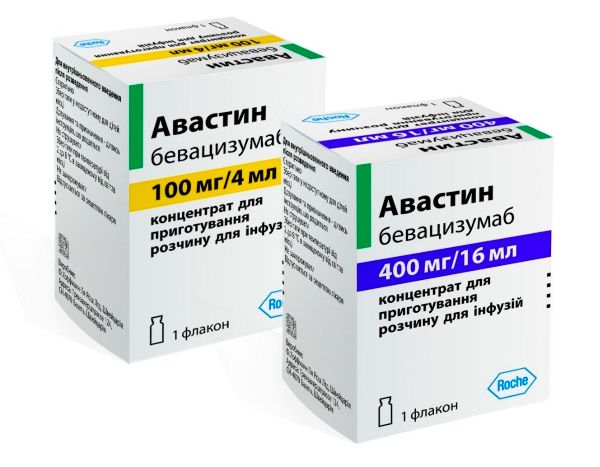
- Any interactions with other drugs must be agreed upon with the attending physician. When Avastin is used simultaneously with platinum drugs, the risk of neutropenia, infectious complications and possible death increases.
- Overdose: severe migraine attacks, exacerbation of adverse reactions. Symptomatic therapy is used to eliminate these reactions; there is no specific antidote.
Vials with Avastin concentrate should be stored at a temperature of 2-8 degrees, freezing or shaking is contraindicated. Shelf life is 24 months.
Taxotere
An antineoplastic agent, an alkaloid obtained by chemical semisynthesis from the European yew. Taxotere is responsible for the accumulation of tubulin in cell nuclei, preventing the breakdown of tubulin tubes during cancer cell division. This provokes the death of malignant cells. The drug is intended for intravenous administration, 95% conjugates with blood plasma proteins.

The medicine is available as an infusion solution in 200 and 500 ml glass bottles. The solution has an oily consistency of yellow color. One bottle contains 40 mg of docetaxel trihydrate, the auxiliary components are: water for injection, polysorbate, nitrogen and others.
- Indications for use: non-small cell lung cancer with metastases (in the absence of a positive effect from previous chemotherapy), malignant lesions of the mammary gland, ovarian carcinoma, hormone-resistant forms of prostate cancer and their metastatic types.
- Method of administration and dosage: treatment is carried out in a hospital setting. In lung cancer, Taxotere is administered at 75 mg/m2 over 30 hours to half an hour, after a preliminary infusion of cisplatin. If treatment with platinum drugs is ineffective, Taxotere is used without additional drugs. In breast tumors, 100 mg/m2 of the patient's body area is prescribed. In prostate lesions with metastases, 75 mg/m2. Infusions are administered once every three weeks, the course of treatment is determined by the severity of the clinical response and the patient's tolerance of the drug.
- Side effects: most often, patients experience headaches and dizziness, neutropenia, secondary infections, anemia. Stomatitis, diarrhea, severe dyspeptic syndrome, myalgia and alopecia are possible. A month after the administration of the drug, some patients developed peripheral edema caused by increased capillary permeability, arrhythmia, weight gain or anorexia.
- Contraindications: hypersensitivity to active substances, severe renal failure, neutropenia. Not used during pregnancy and lactation. When treating women of childbearing age, patients should use contraceptives.
- Interaction with other drugs: Doxorubicin increases the clearance of tablets, Ketoconazole, Erythromycin, Cyclosporine inhibit metabolism by cross-blocking cytochrome P450-3A.
- Overdose: symptoms of stomatitis, peripheral neuropathy, and suppression of hematopoiesis appear. Symptomatic therapy and dynamic monitoring of body functions are indicated to eliminate them.
Doxorubicin
An antitumor drug from the pharmacological group of anthracycline antibiotics. Doxorubicin has a mechanism of action based on the suppression of nucleic acid synthesis and DNA binding. It is intended for intravenous administration, does not penetrate the BBB, is biotransformed in the liver, and is excreted unchanged in the bile.
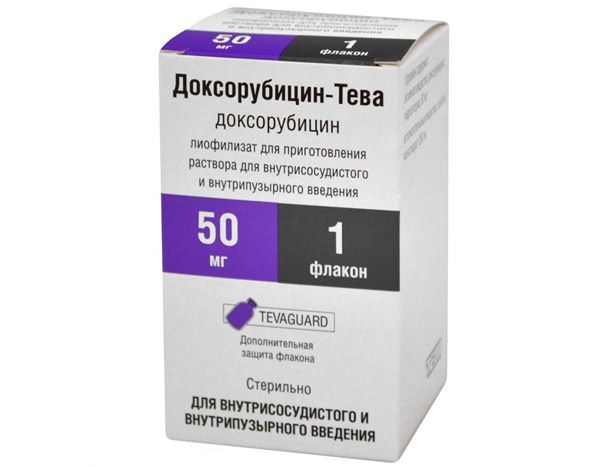
- Indications for use: malignant lung lesions, soft tissue sarcoma, Ewing's sarcoma, osteogenic sarcoma, lymphoblastic leukemia, neuroblastoma, bladder tumors, stomach cancer, ovarian cancer, thyroid cancer, breast cancer, trophoblastic tumors, lymphogranulomatosis. The dosage and duration of treatment are individual for each patient and depend on the indications for use of the drug.
- Contraindications: anemia, cardiovascular diseases, hepatitis, pregnancy and breastfeeding, thrombocytopenia, severe leukopenia. Not used to treat patients with a full cumulative dose of other anthracyclines or anthracenes.
- Side effects occur in many organs and systems, but most often patients experience the following reactions: anemia, leukopenia, heart failure, arrhythmia, cardiomyopathy, thrombocytopenia, stomatitis, abdominal pain, nausea, vomiting and diarrhea, amenorrhea, skin allergic reactions, sudden increase in temperature, alopecia, nephropathy. Local reactions are also possible: tissue necrosis, vascular sclerosis.
- The drug is prescribed with special caution to patients with chickenpox, cardiovascular diseases in the anamnesis, herpes zoster and other infectious diseases. Doxorubicin can cause urine to turn red in the first days of treatment.
Erlotinib
Antitumor agent, tyrosine kinase inhibitor of epidermal growth factor receptors HER1/EGFR. Erlotinib is available in tablet form, with the active substance erlotinib. After oral administration, the drug is rapidly absorbed, the maximum concentration in the blood plasma is achieved after 4 hours, bioavailability is 59% (increases with food intake). It is excreted in feces and urine.
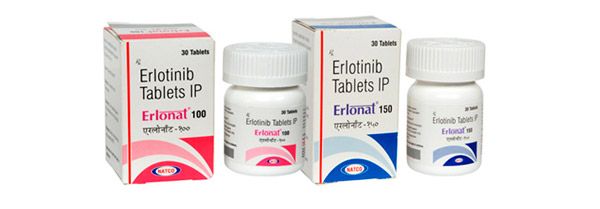
- Indications for use: metastatic non-small cell and locally advanced lung cancer (can be used after previous unsuccessful chemotherapy regimens), metastatic and locally advanced inoperable pancreatic tumors (used in combination with Gemcitabine).
- Method of administration and dosage: take the tablet once a day, one hour before or two hours after meals. For lung lesions, 150 mg is prescribed daily for a long period of time. For pancreatic cancer - 100 mg in combination with gemcitabine. If the drug causes symptoms of disease progression, then treatment is stopped.
- Contraindications: pregnancy and lactation, hypersensitivity to the active component and other components of the tablets. With special caution, it is prescribed for the treatment of patients under 18 years of age and with impaired liver function.
- Side effects: gastrointestinal bleeding, liver dysfunction, stomatitis, diarrhea, vomiting, abdominal pain. The following reactions are possible from the respiratory system: shortness of breath, nosebleed, cough, pulmonary infiltration, fibrosis. From the organs of vision: conjunctivitis, increased lacrimation. Attacks of headache, dry skin, itching, skin allergic reactions are also possible.
- Overdose is possible when taking high doses. Adverse symptoms most often manifest themselves in the form of dermatological reactions, diarrhea, increased activity of liver transaminases. To treat them, it is necessary to stop taking the drug and conduct symptomatic therapy.
If Erlotinib is used with Ketoconazole and other CYP3A4 isoenzyme inhibitors, a decrease in the metabolism of the anticancer agent and an increase in its concentration in the blood plasma are observed. Rifampicin increases the metabolism of the main drug and reduces its concentration in the blood plasma. When interacting with coumarin derivatives and Warfarin, gastrointestinal bleeding and an increase in INR occur.
Afatinib
Protein kinase inhibitor, effective antitumor agent. Afatinib is a selective, irreversible blocker of protein tyrosine kinase receptors. After oral administration, it is rapidly and completely absorbed, food intake does not affect its concentration in the blood plasma. Metabolic reactions are catalyzed by enzymes, excreted in urine and feces.
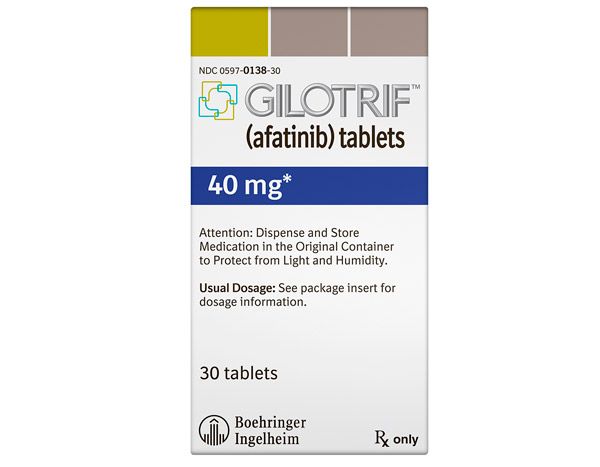
- Indications for use: monotherapy of locally advanced and metastatic non-small cell lung cancer with mutations of epidermal growth receptors. The dosage depends on the stage of the pathological process. With standard therapy, 40 mg of Afatinib is taken once a day, the maximum daily dose is 50 mg. Tablets should be taken one hour before meals or 3 hours after them.
- Contraindications: intolerance to the components of the drug, severe liver dysfunction, pregnancy and lactation, patients under 18 years of age. Use with special caution in keratitis (ulcerative), interstitial lung disease, heart pathologies, galactose intolerance, severe dry eyes.
- Side effects: most often, patients experience taste sensitivity disorders, conjunctivitis, nosebleeds, stomatitis. Attacks of nausea and vomiting, constipation, increased bilirubin, liver failure, skin allergic reactions, muscle spasms, various infections are possible.
- Overdose occurs when the dosage prescribed by the doctor is exceeded. Most often, patients experience gastrointestinal disorders, skin allergic rashes, headaches and dizziness, nausea and vomiting, and increased amylase levels. There is no specific antidote, so symptomatic therapy and drug withdrawal are indicated.
 [ 11 ], [ 12 ], [ 13 ], [ 14 ], [ 15 ], [ 16 ], [ 17 ]
[ 11 ], [ 12 ], [ 13 ], [ 14 ], [ 15 ], [ 16 ], [ 17 ]
Crizotinib
Crizotinib is an inhibitor of hepatocyte growth factor receptors. It has selective inhibitory activity, induces apoptosis of malignant cells. The anticancer effect is dose-dependent and is associated with the severity of pharmacological inhibition. The drug is available in capsules, with the active substance - crizotinib 200 mg.
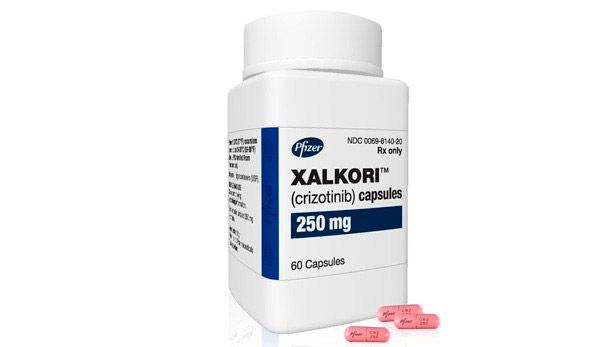
After a single dose on an empty stomach, the maximum concentration in blood plasma is achieved after 4-6 hours. Bioavailability 43%, metabolizes by CYP3A4/5 isoenzymes, excreted in urine and feces.
- Indications for use: widespread non-small cell lung cancer expressing anaplastic lymphoma kinase. Tablets are taken orally with water. The recommended standard dosage is 250 mg twice a day. The course of treatment is long, until positive results of therapy are obtained. If necessary, the doctor adjusts the dosage.
- Contraindications: hypersensitivity to the components of the drug, liver and kidney dysfunction, pregnancy and lactation, patients under 18 years of age. Not used simultaneously with powerful CYP3A enzyme inducers. With special caution, it is prescribed for patients with cardiovascular diseases, for elderly patients and with electrolyte imbalance.
- Side effects are manifested by a number of unfavorable symptoms from many organs and systems. Most often, patients complain of attacks of nausea and vomiting, diarrhea, constipation, increased swelling and fatigue. There may also be attacks of bradycardia, visual impairment, neutropenia, decreased appetite, skin allergic reactions, infections of the upper respiratory tract and urinary system. Overdose has similar symptoms. There is no specific antidote, so symptomatic therapy and gastric lavage are indicated.
 [ 18 ], [ 19 ], [ 20 ], [ 21 ], [ 22 ], [ 23 ], [ 24 ], [ 25 ]
[ 18 ], [ 19 ], [ 20 ], [ 21 ], [ 22 ], [ 23 ], [ 24 ], [ 25 ]
Ceritinib
A tablet antitumor drug with the active ingredient ceritinib, auxiliary components: magnesium stearate, microcrystalline cellulose, titanium dioxide and others. After entering the body, the active component finds cancer cells and destroys the mutagenic protein, preventing damage to healthy tissues and tumor growth.
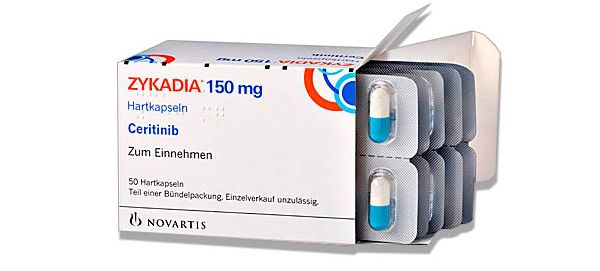
The maximum concentration in blood plasma is achieved 4-6 hours after administration. If the drug is used 2 hours after a meal, its effect on the body increases, and the risk of side effects decreases. It is excreted 41 hours after administration, with urine and feces.
- Indications for use: non-small cell lung cancer with positive anaplastic lymphoma kinase. Can be used as monotherapy if previously used drugs are ineffective.
- Method of administration and dosage: tablets are taken only as prescribed by a doctor. The standard dose is 750 mg per day, two hours before or two hours after meals. Do not chew the capsules, swallow them whole with water. The course of treatment lasts until signs of cancer retreat appear.
- Contraindications: individual intolerance to the components of the product, patients under 18 years of age, pregnancy and lactation.
- Side effects: nausea, vomiting, abdominal pain, headaches and dizziness, increased urination, increased blood sugar, bradycardia, decreased appetite, dermatological reactions (itching, burning, rash).
Attention!
To simplify the perception of information, this instruction for use of the drug "Lung cancer pills" translated and presented in a special form on the basis of the official instructions for medical use of the drug. Before use read the annotation that came directly to medicines.
Description provided for informational purposes and is not a guide to self-healing. The need for this drug, the purpose of the treatment regimen, methods and dose of the drug is determined solely by the attending physician. Self-medication is dangerous for your health.

